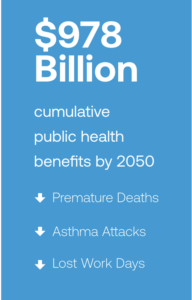A newly-released report from the American Lung Association (ALA) confirms that switching to electric vehicles (EVs) will have a significant impact on air quality. The finding seems unsurprising at first glance — of course fewer emissions will mean better air quality — but the scale of the improvement and what it means for public health are the key takeaways.
 The ALA report estimates almost 90,000 premature deaths can be avoided, as well as 2.2 million asthma attacks. Between those and lost work days due to air-quality-related health issues, they estimate almost $1 trillion in public health savings in the next 30 years. The impact that wildfires in Canada have had on the entire northern half of the U.S., just in the past few weeks, demonstrates how disruptive bad air quality can be. The New York Times described the conditions from wildfires as “hazardous to breathe everywhere from Minnesota and Indiana to sections of the Mid-Atlantic region and the south.” They also note that this level of air pollution is common in other parts of the world; the World Health Organization (WHO) estimates that up to 99% of the world’s population breathes air below acceptable WHO quality standards. Americans are comparatively fortunate in this measure, but the ALA report estimates that 35% of Americans live in zones where air quality is routinely bad.
The ALA report estimates almost 90,000 premature deaths can be avoided, as well as 2.2 million asthma attacks. Between those and lost work days due to air-quality-related health issues, they estimate almost $1 trillion in public health savings in the next 30 years. The impact that wildfires in Canada have had on the entire northern half of the U.S., just in the past few weeks, demonstrates how disruptive bad air quality can be. The New York Times described the conditions from wildfires as “hazardous to breathe everywhere from Minnesota and Indiana to sections of the Mid-Atlantic region and the south.” They also note that this level of air pollution is common in other parts of the world; the World Health Organization (WHO) estimates that up to 99% of the world’s population breathes air below acceptable WHO quality standards. Americans are comparatively fortunate in this measure, but the ALA report estimates that 35% of Americans live in zones where air quality is routinely bad.
Granted, the ALA study’s findings rest on an assumption of “100 percent zero-emission new passenger vehicle sales and non-combustion energy generation by 2035.” That assumes a sea change level of adoption for EVs that may not materialize in the next 12 years. The biggest takeaway from these studies and reports, though, is that any effort we make to clean the air will improve the lives of the people breathing that air. The New York Times reported that air quality improved significantly everywhere during the COVID-19 pandemic, when far fewer cars were driven. Cab drivers in Bangkok and New Delhi, for example, saw the smog clear over their cities, and it has returned since the end of pandemic restrictions.
At Recharge America, we feel these impacts at a personal level. Stephanie, our national program director, lives in Pennsylvania, in an area where the Canadian wildfires created so much haze that she couldn’t see the mountains almost right outside her door. She commented that her eyes and throat burned after only a minute or two of breathing that air.

You don’t need to be a climate fanatic or drastically change your lifestyle to make a real impact on the quality of the air you and those around you breathe. Every combustion engine that gets swapped out for an EV contributes to cleaning up the air. It’s just another way that EV adoption benefits entire communities and how the ripple effects radiate outward from the people who drive them.

